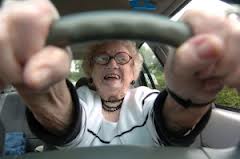 How many of you were on the road this past Memorial Day weekend? It is something of an American tradition that families get on the road for a long holiday weekend to visit other family members or just get away for a break. This past weekend had an estimated 36+ million cars travelling 50+ miles on America’s roads. How many of these drivers were over the age of 65, and why should that be important to caregivers to older adults?
How many of you were on the road this past Memorial Day weekend? It is something of an American tradition that families get on the road for a long holiday weekend to visit other family members or just get away for a break. This past weekend had an estimated 36+ million cars travelling 50+ miles on America’s roads. How many of these drivers were over the age of 65, and why should that be important to caregivers to older adults?
Drivers over the age of 65 have a higher accident rate than any other age cohort except the teens, and by the year 2025 65+ year olds will represent one in every four drivers on the road. Drivers 85 and older have the highest fatal crash statistics of any cohort. This may not be due just to the motor function of older bodies; AAA statistics show that 95% of seniors are on a medication that can impair their driving. And that should be important to caregivers to older loved ones, because it not only puts the loved one at risk but also the other drivers who just happen to be on the road along with them. Yet, research from the National Safety Council shows that caregivers to older adults would much rather talk with an older loved one about funeral plans than about their car keys.
So, what can a caregiver do? First, it is important to recognize that older drivers can and do make a lot of safe driving choices. The “do not text while driving laws” were not, after all, written with seniors in mind. Yet, reflexes and visual acuity begin to slip beyond a certain age, and driving is nothing if not a skill set that depends on split second timing of both perceptions and reactions. The American Automobile Association is here to help caregivers and older adults. They have a host of resources that can be valuable to everyone, even the older driver who wishes to do a self-assessment of their skills on the road.
The first step is to thoughtfully consider whether your older loved one does, in fact, pose a risk with their current driving habits. You may also wish to speak with their primary care physician for his/her assessment of your older loved one’s physical abilities. Then if driving is a risky proposition, take a deep breath, try to put yourself behind your loved one’s steering wheel and talk to your older loved one about your concerns. Recommend that they judge for themselves. On the “SeniorDriving.AAA.com” web site they have a self-exam that anyone can take to get a second opinion on their driving capacity. You might consider taking it yourself first so that you can speak to questions your care receiver may have. There also is a host of other options such as helping make the care fit your older loved one, improving their driving skills or learning the driving laws and licensing requirements for older adults in their state of residence.
Charlotte Bishop is a Geriatric Care Manager and founder of Creative Care Management, certified professionals who are geriatric advocates, resources, counselors and friends to older adults and their families in metropolitan Chicago. Please email your questions to info@cr eativecaremanagement.com.







